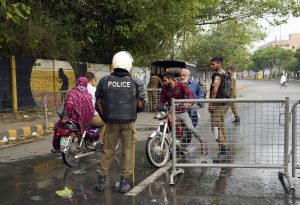Terrorist groups are byproducts of conflicts and instability. They thrive in such conditions and exploit them to further their narratives, and draw recruits and funding. Terrorist groups also use anarchy as a cover to undermine the adversarial state’s writ and use it to carry out attacks, particularly in high-security zones. The greater the chaos, the more the chances for terrorist groups to flourish in a society.
Pakistan is no stranger to political instability and terrorism, but the current spate of political tensions pitting former Prime Minister Imran Khan, the country’s most popular political leader, against the army chief Gen. Asim Munir, the country’s most powerful man, is unprecedented. Presently, Pakistan is confronted with a three-fold reinforcing crisis of political instability, economic volatility, and resurging terrorism.
Khan’s dramatic arrest by the paramilitary Punjab Rangers on May 9 sparked protests and riots by his supporters. They targeted the Pakistan Army’s installations, symbols and check posts, pushing political tensions to a breaking point.
Against this backdrop, terrorist groups in Pakistan, particularly Tehreek-e-Taliban Pakistan (TTP) and Baloch separatists, can be expected to exploit the current political tensions to motivate their fighters. The leadership of these groups will seek to signal to their rank-and-file that concerted militant campaigns can push them closer to their goals.
The Pakistani state’s highhandedness in dealing with the political opposition, and the Pakistan Democratic Movement (PDM) government’s inability to control skyrocketing prices of commodities and finalize a deal with the International Monetary Fund to stop the devaluation of the rupee, have eroded public confidence in the current dispensation. In a situation where the franchise and the right to peaceful protest, notwithstanding the violent riots after Khan’s arrest, are blocked, angry youth could resort to violence, particularly in peripheral conflict zones.
It is important to mention that despite the dissolution of the Punjab and Khyber Pakhtunkhwa assemblies in January, the PDM government has decided, despite the Supreme Court’s orders to the contrary, not to hold elections in the two provinces within the constitutionally mandated period of 90 days on account of security and lack of funds.
This atmosphere is tailor-made for terrorist groups to lure vulnerable youth to join their ranks and achieve forcefully what has been denied to them peacefully.
Following the Taliban’s takeover of Afghanistan in August 2021, the security situation in Pakistan was already volatile, resulting in a 52 percent increase in terrorism. In this situation, the PDM government’s decision to call the Pakistan Army under Article 245 of the Constitution to restore and maintain order in Punjab and Khyber Pakhtunkhwa provinces will not only expose troops to potential attacks in the main cities but also divert their attention from ongoing counterterrorism and counterinsurgency operations.
It bears mention that the police have been the main target of TTP’s attacks in Khyber Pakhtunkhwa. Furthermore, the current political polarization in Pakistan will also undermine the security forces’ efforts to forge a national consensus in fighting terrorist groups and get political ownership of counterterrorism campaigns.
Hence, the statement from TTP’s influential commander Mufti Sarbakaf Mohmad, the so-called governor of the group’s Balochistan wilayat, is unsurprising because he held the military responsible for Pakistan’s current political ordeal. He congratulated the angry protesters for vandalizing and torching military installations across the country, particularly the attack on a senior military official’s residence in Lahore. Furthermore, he threw his weight behind protesters and extended his support for similar incidents in the future. He also urged TTP militants in Pakistan’s main cities to target military installations under the cover of protests.
Evidently, TTP through its propaganda is trying to exploit the state-society divisions to draw recruits and legitimacy for its violent campaign, and use the chaos as a shield to expand its network to Pakistan’s main cities. The longer the volatile situation prevails, the better it will be for TTP.
Alarmingly, during the current protests, Karachi police foiled a suicide attack targeting a Chinese-owned boatyard in the port city. Police guards stationed at a checkpoint outside the boatyard killed one militant wearing a suicide vest, while the other one fled. At the time of the attack, 31 Chinese nationals were inside the boatyard, repairing ships. Had the attackers managed to get inside the boatyard premises and detonated the vest, its security implications for the China Pakistan Economic Corridor would have been far-reaching.
Likewise, a little-known militant group, Tehreek-e-Jihad Pakistan, targeted a camp of the paramilitary Frontier Corps in Balochistan’s Qilla Saifullah district on May 12, resulting in a 24-hour standoff. The attack left two Pakistani soldiers dead and all seven attackers were eliminated during the clean-up operation.
Though a dramatic rise in terrorist attacks has not been witnessed during the ongoing military-Khan tensions in Pakistan, the intent of terrorist groups to exploit this situation is visible. The more the military resorts to political repression and other high-handed tactics, the more openings it will create for terrorist groups to exploit the anger of youth by urging them to take up arms to achieve their goals.
Furthermore, the heavy presence of troops on the streets of major cities will make them easy targets for terrorists. So, the stakeholders in Pakistan will have to come down from their high horses and revisit their current approach of quelling the political protests and dissent. The country needs a consensus among different state institutions and political actors over an election date, keeping in view the political, economic, and security challenges.













